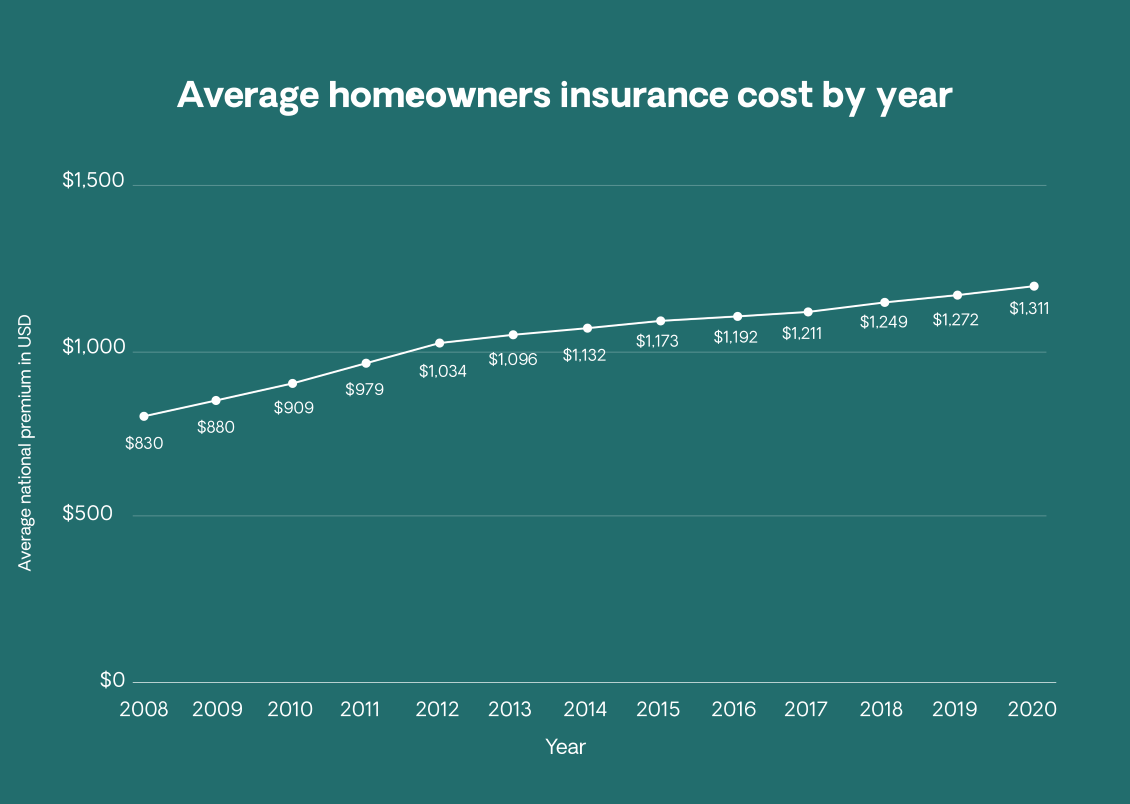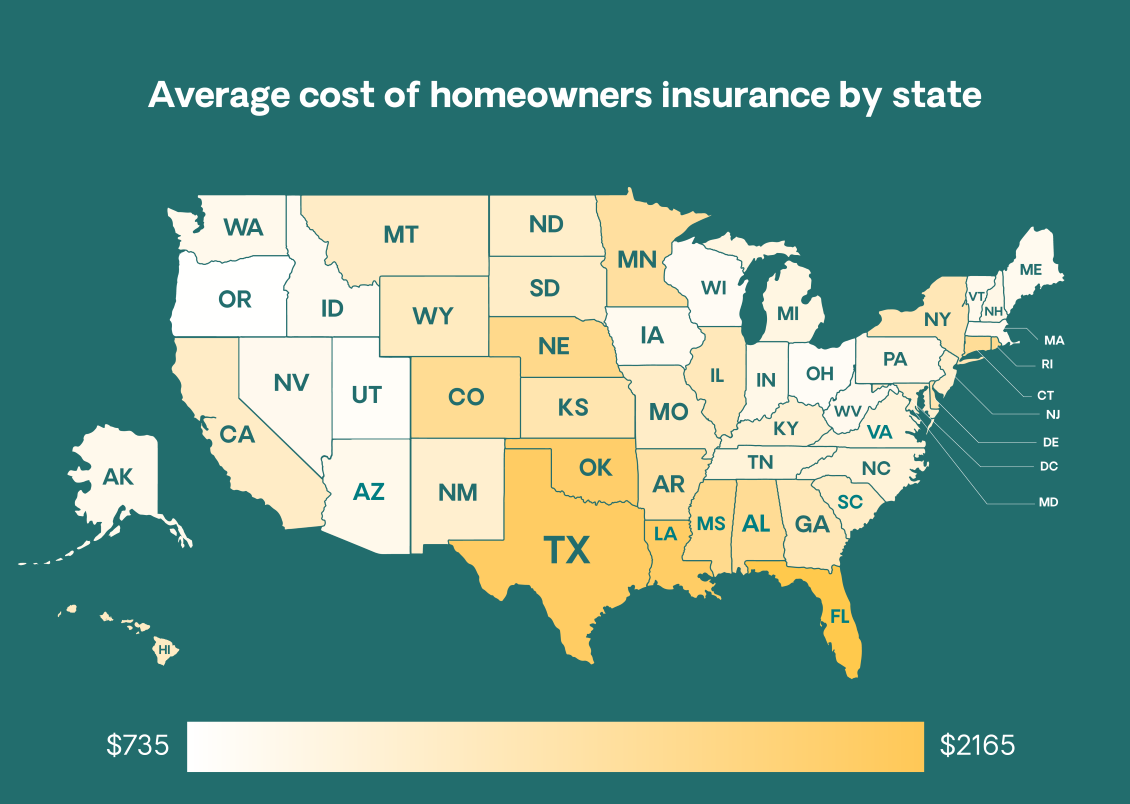The average cost of homeowners insurance
The national average cost of homeowners insurance is $1,311 and has been steadily increasing each year.
Many folks buy homeowners insurance because it’s required by their mortgage company, but it’s important to remember the real value of your policy. Your coverage is a safety net in the worst-case scenario. Should disaster strike, your investment protects your home and belongings so you and your family can recover faster.
But we get it – no one is trying to spend more on home insurance than they have to. The average cost of home insurance in the US is $1,311 per year, and premiums are trending upward due to a variety of reasons, like inflation and climate change.

Source: The Insurance Information Institute, Facts + Statistics: Homeowners and Renters Insurance, Accessed 12/13/2023.
That said, your individual costs depend on several factors, such as:
-
Where you live and your region’s weather-related risks.
-
The amount of coverage you carry (the higher your limits, the pricier the policy).
-
The characteristics of your home (value, roof type, age, construction, etc.).
-
Your deductible.
-
Your background (your insurance score, claims history, and available discounts).
These variables mean that the cost of home insurance fluctuates – a lot. That’s why it’s difficult to give a straightforward answer to questions like, “What is a good price for home insurance?”.
Your state’s averages can provide a better idea of what you might pay for home insurance. Let’s take a look.
Average cost of homeowners insurance by state

|
State
|
Avg Premium
|
State
|
Avg Premium
|
|
Alabama
|
$1,501
|
Montana
|
$1,347
|
|
Alaska
|
$989
|
Nebraska
|
$1,586
|
|
Arizona
|
$866
|
Nevada
|
$824
|
|
Arkansas
|
$1,498
|
New Hampshire
|
$1,048
|
|
California
|
$1,241
|
New Jersey
|
$1,277
|
|
Colorado
|
$1,667
|
New Mexico
|
$1,151
|
|
Connecticut
|
$1,582
|
New York
|
$1,356
|
|
Delaware
|
$907
|
North Carolina
|
$1,119
|
|
D.C.
|
$1,229
|
North Dakota
|
$1,230
|
|
Florida
|
$2,165
|
Ohio
|
$871
|
|
Georgia
|
$1,403
|
Oklahoma
|
$2,040
|
|
Hawaii
|
$1,245
|
Oregon
|
$735
|
|
Idaho
|
$810
|
Pennsylvania
|
$967
|
|
Illinois
|
$1,144
|
Rhode Island
|
$1,788
|
|
Indiana
|
$1,021
|
South Carolina
|
$1,327
|
|
Iowa
|
$998
|
South Dakota
|
$1,222
|
|
Kansas
|
$1,478
|
Tennessee
|
$1,296
|
|
Kentucky
|
$1,174
|
Texas
|
$2,000
|
|
Louisiana
|
$2,038
|
Utah
|
$764
|
|
Maine
|
$956
|
Vermont
|
$984
|
|
Maryland
|
$1,169
|
Virginia
|
$1,107
|
|
Massachusetts
|
$1,667
|
Washington
|
$937
|
|
Michigan
|
$1,002
|
West Virginia
|
$974
|
|
Minnesota
|
$1,481
|
Wisconsin
|
$762
|
|
Mississippi
|
$1,674
|
Wyoming
|
$1,308
|
|
Missouri
|
$1,301
|
United States
|
$1,311
|
Source: The Insurance Information Institute, Facts + Statistics: Homeowners and Renters Insurance, Accessed 12/13/2023. To get the average home insurance cost per month simply divide the costs above by twelve.
Why do home insurance costs vary by the state?
Every state has its own rules, regulations, and risks. While some perils are universal – a home can get broken into anywhere – others are regionally specific. For example, a home along the coast of Florida is uniquely exposed to hurricanes, while one in Oklahoma typically has more risk for tornadoes and earthquakes. Arizona homes face serious wildfire risk, but homeowners in Louisiana worry more about flooding and hurricanes.
On the other side of the coin, landlocked homes in the Midwest and West – Utah, Wisconsin, Idaho, and Nevada – often have lower home insurance rates because they are exposed to fewer catastrophes.
It’s also worth noting that where you get your home insurance can seriously impact how much you pay for coverage. For example, while the average cost for Florida home insurance is $2,165 per year, the average annual cost for Kin members is $2,050.
Your city can influence your rates, too. Here’s what our data shows as the yearly average premiums Kin customers pay in a few Florida cities:
With that in mind, let’s look at the highest and lowest home insurance costs by state.
Top 5 most expensive states for home insurance
The following states have the highest home insurance premiums:
-
Florida: $2,165
-
Oklahoma: $2,040
-
Louisiana: $2,038
-
Texas: $2,000
-
Rhode Island: $1,788
Top 5 least expensive states for home insurance
The following states have the lowest average home insurance premiums:
-
Oregon: $735
-
Wisconsin: $762
-
Utah: $764
-
Idaho: $810
-
Nevada: $824
Impact of coverage limits on homeowners insurance cost
Now’s a good time to remind you that the coverage amount you choose impacts your home insurance premium, too. Most homeowners get an HO3 policy that offers open-perils coverage for the dwelling and named perils coverage for personal property – that’s pretty standard for a home insurance policy. But if you opt for all-perils coverage for your belongings, too, your premium increases accordingly.
Similarly, your policy limits – or the amount of coverage you have – for your dwelling impacts your costs. You should note that homeowners insurance policies usually have a coinsurance clause that requires you to carry coverage that matches a certain percentage of your home’s total value.
How your home’s characteristics impact the cost of home insurance
If your home’s replacement cost – that is, how much it would cost to rebuild it from the ground up – is high, your premium will be higher, too. As illustrated above, the amount of dwelling coverage you have can impact your rates considerably.
For homeowners in Florida, the home’s roof shape and wind mitigation measures can be a significant cost factor, too. Hip-shaped roofs tend to weather hurricane winds better, so they may fetch a lower rate. A homeowner who has invested in other wind mitigation measures, like stronger roof-to-wall connections, roof-to-deck connections, and roofing materials, can lower their rates even more.
Cost factors you can control
|
Cost factors you can control
|
Cost factors that are mostly fixed
|
|
Coverage types and amounts
|
Location
|
|
Deductibles
|
Claims history
|
|
Risk mitigation discounts
|
Home age and replacement cost
|
Cost factors you can control
The following factors impact your home insurance costs, but you can tinker with them to make your policy more affordable:
-
Your coverage types and amounts. The more coverage you have, the more your policy costs. That’s why it’s smart to comparison shop and weigh the amount of coverage against the cost of coverage. Ideally, you want a policy that offers the maximum amount of coverage at the most affordable price.
-
Your deductibles. Typically, the higher your deductible amount, the lower your premium. That’s because when you accept a higher deductible, your insurer will simply have to pay out less for a claim.
-
Your homeowners insurance discounts. Ask your insurer about every discount you may qualify for. With Kin, homeowners may be eligible for wind mitigation discounts, claims-free discounts, fire and security alarm discounts, and more depending on their state.
Cost factors that are largely out of your hands
The following variables are often fixed but have a significant impact on your home insurance rates:
-
Where you live. Your location has the biggest impact on your premium. Chances are you’ll pay a higher rate if your home is in an area prone to catastrophes like hurricanes and wildfires. If your home is remote and far from fire stations and emergency services, your rate may be higher. And if you’re in an area with a high rate of property crimes, that can drive up your cost, too.
-
Claims history. While you can contest your claims record in certain situations and not all types of claims have the same impact on your rates, a checkered claims history may increase your premium. Luckily, claims do fall off your record eventually.
-
How old your home is. An older home with outdated plumbing and older wiring can increase your premiums or make a home ineligible for coverage. While you can’t change the construction date of your home, you can make updates that make the home safer and more affordable to insure.
-
The cost to rebuild your home. If you have a sprawling, high-value house that is custom-built, it’s going to cost more to insure it for its replacement cost. In the event of a total loss, both the quantity and the quality of materials may cost more at the current market value to match what you originally had.
Finding cheap homeowners insurance: 8 ways to save
While you can’t control some factors that influence your homeowners insurance cost, such as your home’s location, its age, and its replacement cost, there are some things you can do to reduce your rates.
These tips can help you get the cheapest homeowners insurance possible without sacrificing the quality of your coverage.
1. Comparison shop
Don’t go with the first insurance provider you find or the one your parents use. The best way to make sure you get a good deal on your coverage is to shop around. Get a quote from a few different providers, and don’t look at price alone. You’ll also want to consider:
-
The reputation of the company. Check out their online reviews to get a glimpse into the customer experience you can expect.
-
The amount and type of coverage offered. You might save a few dollars with an actual-cash value policy, but you will sacrifice coverage. It’s wise to only consider policies that offer replacement-cost coverage.
2. Get the right amount of coverage
When you find an insurance provider you trust, this part should be easy. A good insurance provider will help you choose the appropriate amount of coverage for your home, your belongings, and your liability. Not too much coverage, which can drive up your premiums, and not too little, which leaves you inadequately protected.
Ideally, your policy will offer replacement cost coverage for both your home (which means you can rebuild with similar materials at the current market rate) and your belongings (which allows you to replace your missing or damaged possessions with similar, new items).
3. Rethink your deductible
Typically, the higher your deductible, the lower your premium will be. While it may be tempting to choose the highest possible deductible to offset your monthly bill, be careful. You don’t want to choose such a high deductible that it puts an unreasonable financial burden on you when you need to make a claim.
For reference, Kin customers can choose between the following standard deductible options:
-
Alabama: $500, $1,000, $2,500, $5,000, $10,000
-
Arizona: $500, $1,000, $2,500, $5,000, $10,000
-
Florida: $500, $1,000, $2,500, $5,000 or 1%, 2%, 3%, or 5% of your dwelling coverage
-
Louisiana: $500, $1,000, $2,500, $5,000, $7,500, $1,0000 or 1%, 2%, 3%, 4%, 5%, or 10% of your dwelling coverage
-
Mississippi: $500, $1,000, $2,500, $5,000, $10,000
-
South Carolina: $500, $1,000, $2,500, $5,000, $10,000
-
Virginia: $500, $1,000, $2,500, $5,000, $10,000
4. Avoid risky investments
While you can’t pick up your home and move it to a new location, you can opt out of adding things to your home that may raise your premium. For example, you might beat the average price of home insurance by not having:
-
Swimming pools usually raise the cost of your coverage because they increase your liability exposure.
-
Trampolines, while fun, are injuries waiting to happen. Trampolines raise your risk of visitor injuries and so increase your liability coverage needs.
5. Make your home safer
Certain updates to your house not only make the home safer, but they can also cut your home insurance costs. For example, the following improvements may reduce your bill:
-
Fix your roof. Replacing your roof can substantially cut down on your insurance costs. Some areas may see savings up to 10%.
-
Mitigate wind risk. This is a big money saver if you live in hurricane-prone areas. In fact, in Florida, insurance providers are legally required to offer discounts for wind-resistant homes. Consider investing in stronger roof-to-deck and roof-to-wall attachments, storm shutters, fortified garage doors, and shatter-proof windows.
-
Upgrade your HVAC, electrical, and plumbing systems. Newer systems often fetch a substantial discount.
-
Get a generator. Some insurers offer a discount for homes that have a backup generator.
-
Invest in a centrally monitored security system. Depending on where you live, you can get a 5% to 7.5% discount on your insurance from Kin when you have proof of a centrally monitored security system.
-
Install an automatic water shut off. Kin offers customers a discount when they have a system that automatically shuts off the water supply when a leak is detected.
Before making big investments, talk to your insurance agent to see what kind of discounts you can expect from each improvement. That can help you spend money that will be offset by savings down the road.
6. Boost your credit score
Most insurers can use your insurance score, which can be partially based on your credit score, as a factor to determine your premium. The logic is the better your score, the less likely you are to make a claim (and subsequently, you qualify for lower rates).
To improve your credit score and reduce your insurance bill, you can:
-
Pay your bills on time.
-
Don’t carry a balance from month to month.
-
Don’t use more than 30% of your credit limit.
-
Don’t take out more lines of credit than you need.
7. Review your policy when you renew
We get the impulse to buy and forget about your coverage, but a yearly review is a good practice for a few reasons:
-
You want to make sure your coverage still reflects the reality of your living situation. If you remodeled or bought some valuable new belongings, you want to make sure your policy still offers adequate protection.
-
You get to see if you qualify for more discounts. If you made security updates or upgraded your home’s systems, you may be eligible for lower rates.
-
You want the chance to get rid of coverage you no longer need. Got rid of that trampoline? Great! Before you renew your coverage, let your agent know about possessions you no longer need to protect and liabilities you no longer need to address.
8. Ask your insurance company for pro tips
Every insurance company offers different discounts, prices, and coverage. Luckily, they also typically offer assistance to help you figure these out. So while the tips here apply to most insurers, you’ll get the best insight from a provider who can give you the scoop on:
The bottom line
Understanding the factors that go into your premium is a good start to figuring out how to keep your homeowners insurance costs under control. However, the best way to see what it costs to insure your unique home is to get a quote.



